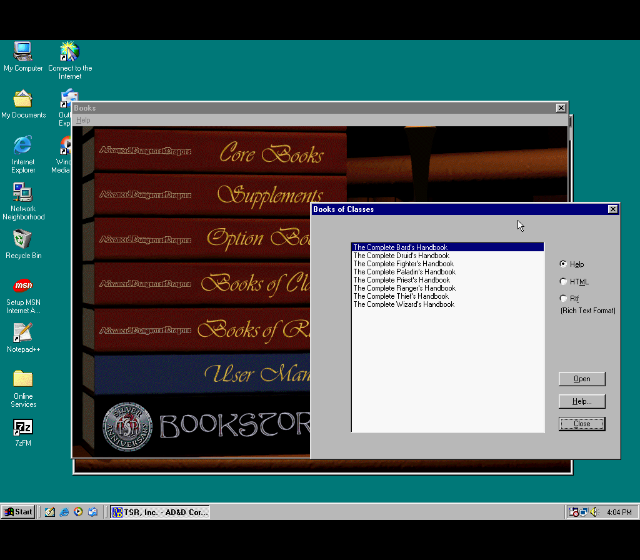
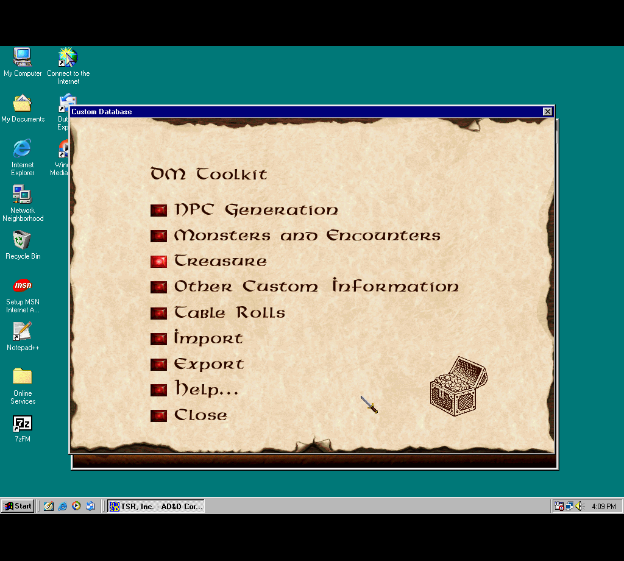
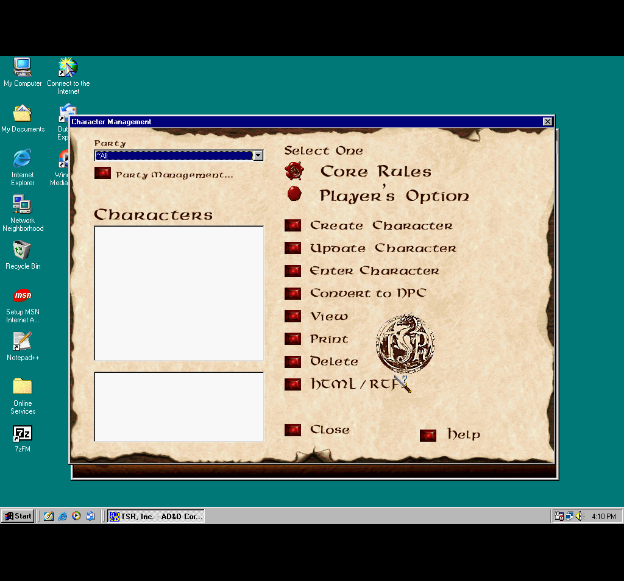


There is probably a lot of nostalgia for going to the computer store and actually buying a game in a physical box. There is a lot to like about this experience compared to buying a game from an online service like Steam. For example getting an actual manual you can hold in your hands while playing the game (and these were often quite substantial, both in size and in details provided.) There were "feelies" in stuff like maps, character art, short fiction, etc. to get you into the mood of the game (and sometimes to act as copy protection.) Beyond what you got, there's just something magical about being able to stroll down an aisle and look at box art and screenshots as you decide what interests you. I would say you only get the same experience in a bookstore now, but most bookstores are so filled with astroturfed crap that even that isn't the same.
I think that one thing gets lost in this experience. People with this nostalgia are often gamers, remembering the time that they got Heroes of Might and Magic 2 or Quake or Pharaoh or whatever from the computer store. What they forget is how much software was of a "utility" variety rather than a game. Probably people remember things like encyclopedias (ex. Encarta) but there were a lot more options available. This essay lists some, such as a medical reference book, how to guide for homes, etc. But what I think is more notable there is the Project A-Ko program which simply featured multimedia from a beloved anime flick of the time. The sky was the limit for what you might see: astronomy programs, garden planning, software for making greeting cards, cartoon makers, etc. Some of these programs were little more than gimmicks, the equivalent of those "planes and trains" VHS/DVDs you used to see. That is, the developers were sitting on some multimedia such as videos and were aware that seeing this stuff on your computer was such a novelty that people would pay for pretty much anything. But many were surprisingly comprehensive.
One of these is the AD&D core rules program. What do you get for this?





In short, you got pretty much anything you'd need to use to keep records for and generate content for a usual 2nd edition game. I may object to what was omitted, for example the books and tools provided do not cover mass combat and strongholds (lacking things like DM1: The Stronghold Book), but the fact is that these things were generally ignored by the players of the game themselves. The program itself does its job perfectly as a companion piece to the campaigns people were actually playing. This wasn't really a piece of niche software either; you could easily walk into an electronics store and buy it just like computer games or office productivity software. Nowadays specialized software like this is often hard to find, usually requiring going to some obscure corner of the web not properly indexed by search engines. Certainly there is utility software for applications like writing documents, making webpages, image manipulation, video editing, etc., but it's difficult to find useful software for more off the wall interests. When it comes to D&D you mainly have "virtual tabletop" software, with small programs for very specific applications, such as making character sheets (only), speeding up combat, etc. But something very nice about the Core Rules program was how interconnected everything was. If you created a new spell, then it could be immediately placed in the known spells of a mage character, in a spellbook appearing as treasure, etc. A new race could access previously created classes and so forth, and could appear as a monster, including for random encounter tables. The current software often lets you put in "custom" skills for your character sheets and the like, but you must do this separately for each specialized program, and after a while you are essentially just keeping your own notes. A program developed from the ground up to just do things for D&D can do a lot more.
On the specific topic of RPGs, Wizards is making noises about making their own help software. But we all know that the main intention of such software is to put users into a subscription model which they must continue paying to keep their campaign going. It will be like when single player games add in "multiplayer content" (like neighboring cities derived from other player data in SimCity) purely to justify their always on DRM schemes. The real intention is for the DRM scheme to be there, the "features" are added later as an ad-hoc rationalization. In the same way, it is unlikely that Wizards will again produce a utility as straightforward and as useful as this Core Rules program.
Of course, the idea of a "utility" or "non-game" program went beyond RPGs. Take for example "The Way Things Work", a program based on the popular (at the time) book:
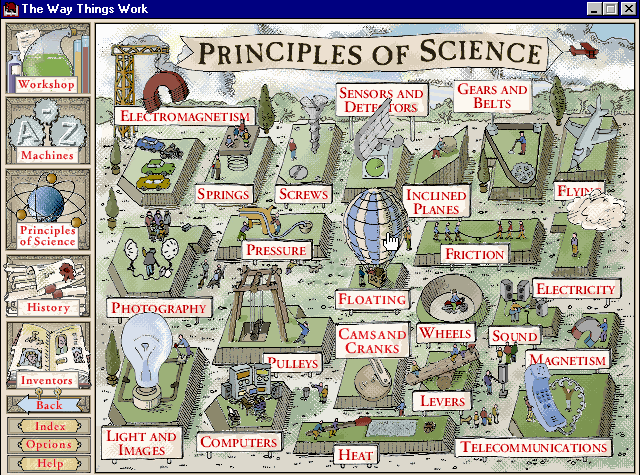
It's basically an online verison of the book, but with many more ways to navigate to the page you are interested in. Each entry often has sub entries which give you more information on a specialized topic, and you can click words to get definitions from a glossary.
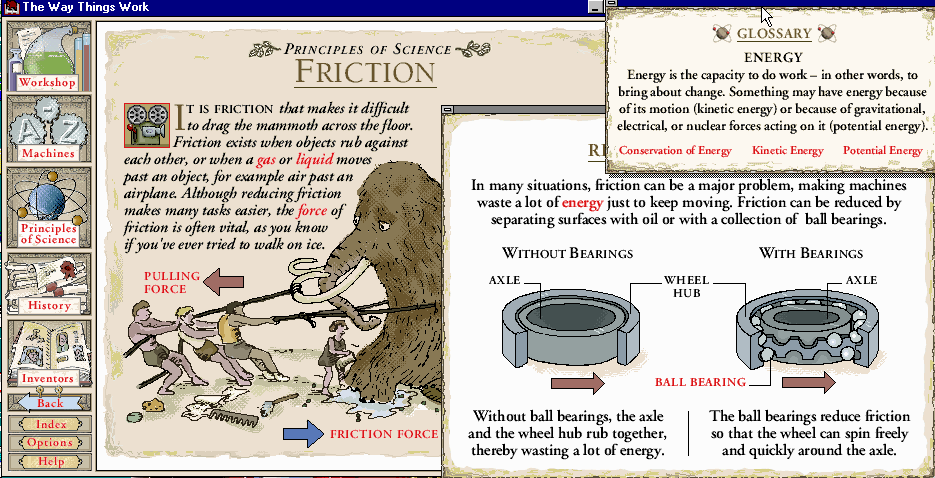
Sometimes these are further illustrated by animations. There are plenty of random nonsense to be had by clicking on random things, and generally silly movies. The end result gives a lot more options than the book, while teaching plenty about notions from engineering and physics, but it can't really be considered a "game." If something like this were released on Steam I am sure that there woudl be many complaints about the lack of content, in that this isn't really something you can "win", but that wasn't really the point. If you search through software from 1993-2002 or so you'll find plenty of examples of software like this, with a very specific purpose that can be done via a computer but which doesn't easily fit into modern game categories.
Now this type of software has largely been replaced by videos on youtube/tiktok for multimedia content and posts on places like reddit for text content. In truth, these are a poor substitute, since you are in someone else's ecoystem. What I mean is that the Way Things Work program can easily put links between its various demonstration pages, add in a glossary that they created themselves, etc. Suppose you try to recreate the experience instead on Youtube. What can you do? You can put links in the descripiton, but this immediately takes you away from the experience (and Youtube has been steadily making the description less prominent anyway.) You can verbally say to watch another video. You can put an embeded video at the end, but the way you can do this is extremely limited, and this is risky since Youtube has broken most previous ways of adding video links. That's about it. And of course there's absolutely nothing like the viewer clicking on a word and getting your own definition; the most that you can really hope for is that the viewer looks up the word in a dictionary himself. Beyond that, youtube is recommending tons of videos that you have absolutely no control over. On an instructional video, chances are very high that the user will be recommended instructional videos from other pepole which may have inaccurate information. On a platform like TikTok all of these problems are several orders of magnitude worse. Similarly, if you are interested in RPG advice, what you are likely to get is a bunch of random videos of different people rambling about D&D in a way that is not comprehensive and likely not to useful to you (especially if you are just looking for specific statistics.) Something has been lost by the absence of the "niche utility" program.
But there is one silver lining. Since the old programs were not "service" programs (i.e. run from an exernal server) you can get your hands on them and run them as before (perhaps with some emulation.) So they still serve the role that they were designed for, just as an old book will. The tragedy is that we are not generating new programs of this type, and that if somneone
July 18, 2023